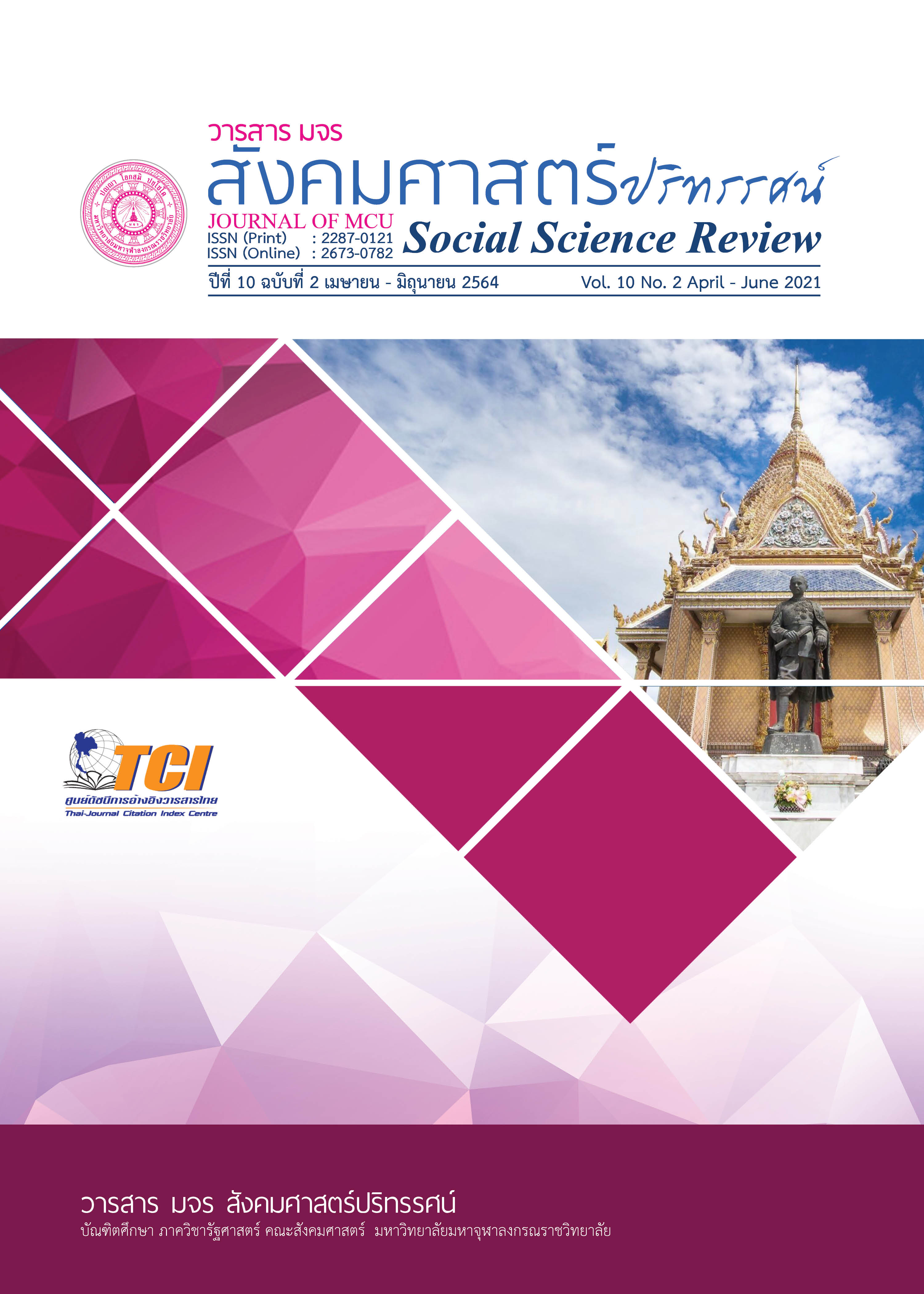สังคมวิทยาของพระพุทธศาสนาเพื่อสังคม: บทวิเคราะห์ว่าด้วย งานสาธารณสงเคราะห์วิถีพุทธของคณะสงฆ์ไทย
คำสำคัญ:
พุทธศาสนาเพื่อสังคม, สาธารณสงเคราะห์, ศาสนากับการพัฒนาบทคัดย่อ
บทความวิจัยนี้มีวัตถุประสงค์เพื่อ 1. วิเคราะห์จุดแข็ง จุดอ่อน โอกาส และภาวะคุกคาม (SWOT. ของการดำเนินการด้านสาธารณสงเคราะห์ของคณะสงฆ์ไทย และ 2. ศึกษาแนวทางการขับเคลื่อนงานสาธารณสงเคราะห์วิถีพุทธและการส่งเสริมเครือข่ายพระสงฆ์นักพัฒนาด้านสาธารณสงเคราะห์ โดยถอดองค์ความรู้จากการวิจัยเชิงคุณภาพ และการวิจัยเชิงปฏิบัติการ โดยการเลือกผู้ให้ข้อมูลสำคัญจากการได้รับรางวัลเพชรงามการสาธารณสงเคราะห์ในปี พ.ศ. 2560 และ 2561 ซึ่งเก็บรวบรวมข้อมูลผ่านเครื่องมือการวิจัย 1. แบบบันทึกข้อมูลปลายเปิด 2. การสัมภาษณ์เชิงลึก 3. การสนทนากลุ่มคณะทำงาน และ 4. การประชุมเชิงปฏิบัติการ ทั้งนี้ได้ใช้แนวคิดทางสังคมวิทยาเป็นหลักสำคัญในการวิเคราะห์ปรากฏการณ์
ผลการวิจัยพบว่า จุดแข็ง จุดอ่อน โอกาส และภาวะคุกคาม ของการดำเนินการด้านสาธารณสงเคราะห์ของคณะสงฆ์ไทยมีความเกี่ยวข้องกับความศรัทธาต่อพุทธศาสนาและการบริหารการจัดการงาน สำหรับแนวทางการขับเคลื่อนงานสาธารณสงเคราะห์วิถีพุทธและการส่งเสริมเครือข่ายพระสงฆ์นักพัฒนาด้านสาธารณสงเคราะห์จำเป็นต้องทำงานเชิงบูรณาการตามหลัก “บวร” คือบ้าน วัด และราชการ เพื่อเป็นการนำพุทธศาสนาเข้าสู่กระบวนการแก้ปัญหาของสังคมได้อย่างยั่งยืน
เอกสารอ้างอิง
ชลวิทย์ เจียรจิตต์. (2560). ศาสนากับการพัฒนา (พิมพ์ครั้งที่ 2). นนทบุรี: ดีไซน์ ดีไลท์.
ฐานิดา บุญวรรโณ. (2563). หมุนนาฬิกาสู่เวลาทางสังคม. กรุงเทพฯ: ILLUMINATIONS.
ประทุม อังกูรโรหิต. (2553). สถาบันทางพระพุทธศาสนากับงานสังคมสงเคราะห์. กรุงเทพฯ:ศูนย์พุทธศาสน์ศึกษาจุฬาลงกรณ์มหาวิทยาลัย.
พระพรหมบัณฑิต (ประยูร ธมฺมจิตฺโต). (2560). ศาสนากับเป้าหมายการพัฒนาที่ยั่งยืน. กรุงเทพฯ : มูลนิธิสิริวัฒนภักดี.
พระมหาสมบูรณ์ วุฑฺฒิกโร. (2548). ขบวนการพระพุทธศาสนาในสังคมยุคใหม่. สืบค้น 1 เมษายน 2564, จาก http://www.mcu.ac.th/site/articlecontent_desc.php?article_id=437&articlegroup_id=102
พินิจ ลาภธนานนท์. (2562). อดีต ปัจจุบัน และอนาคต งานสาธารณสงเคราะห์วิถีพุทธของคณะสงฆ์ไทย (พิมพ์ครั้งที่ 2). นนทบุรี : นิติธรรมการพิมพ์.
อภิญญา เฟื่องฟูสกุล. (2551). มานุษยวิทยาศาสนา: แนวคิดพื้นฐานและข้อถกเถียงทางทฤษฎี.เชียงใหม่: ภาควิชาสังคมวิทยาและมานุษยวิทยา คณะสังคมศาสตร์ มหาวิทยาลัยเชียงใหม่.
________. (2558). ปรากฏการณ์ทางศาสนาในโลกาภิวัตน์. ใน นันทวัฒน์ ฉัตรอุทัย (บรรณาธิการ). จับกระแสสังคมศาสตร์: รวมบทความวิชาการ 50 ปี สังคมวิทยาและมานุษยวิทยา เชียงใหม่. เชียงใหม่: ภาควิชาสังคม วิทยาและมานุษยวิทยา คณะสังคมศาสตร์ เชียงใหม่.
อรัญญา ศิริผล. (2562). ปฏิบัติการศาสนา ทุนจิตวิญญาณ กับการเมืองวัฒนธรรมจีนในชายแดนไทยภาคเหนือ. เชียงใหม่: ศูนย์วิจัยและบริการวิชาการ คณะสังคมศาสตร์ มหาวิทยาลัยเชียงใหม่.
Puri, B. (2006). Engaged Buddhism: The Dalai Lama’s Worldview. New Deli:Oxford University Press.
Queen, C. S. (2000). Introduction: a New Buddhism. in Queen, Christopher S (ed.). Engaged Buddhism in the West. Boston: Wisdom Publications.
ดาวน์โหลด
เผยแพร่แล้ว
รูปแบบการอ้างอิง
ฉบับ
ประเภทบทความ
สัญญาอนุญาต
ลิขสิทธิ์ (c) 2021 วารสาร มจร สังคมศาสตร์ปริทรรศน์

อนุญาตภายใต้เงื่อนไข Creative Commons Attribution-NonCommercial-NoDerivatives 4.0 International License.
เพื่อให้เป็นไปตามกฎหมายลิขสิทธิ์ ผู้นิพนธ์ทุกท่านต้องลงลายมือชื่อในแบบฟอร์มใบมอบลิขสิทธิ์บทความให้แก่วารสารฯ พร้อมกับบทความต้นฉบับที่ได้แก้ไขครั้งสุดท้าย นอกจากนี้ ผู้นิพนธ์ทุกท่านต้องยืนยันว่าบทความต้นฉบับที่ส่งมาตีพิมพ์นั้น ได้ส่งมาตีพิมพ์เฉพาะในวารสาร มจร สังคมศาสตร์ปริทรรศน์ เพียงแห่งเดียวเท่านั้น หากมีการใช้ภาพหรือตารางหรือเนื้อหาอื่นๆ ของผู้นิพนธ์อื่นที่ปรากฏในสิ่งตีพิมพ์อื่นมาแล้ว ผู้นิพนธ์ต้องขออนุญาตเจ้าของลิขสิทธิ์ก่อน พร้อมทั้งแสดงหนังสือที่ได้รับการยินยอมต่อบรรณาธิการ ก่อนที่บทความจะได้รับการตีพิมพ์ หากไม่เป็นไปตามข้อกำหนดเบื้องต้น ทางวารสารจะถอดบทความของท่านออกโดยไม่มีข้อยกเว้นใดๆ ทั้งสิ้น





